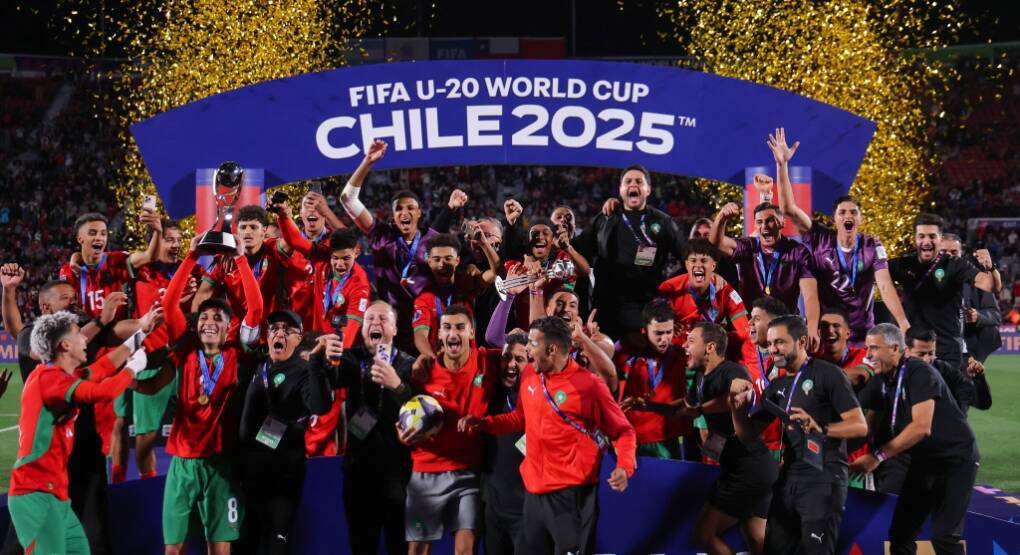Morocco shook the football world by defeating Argentina 2-0 in the final of the 2025 FIFA U-20 World Cup in Chile.
The victory marked the first global football title at any age-group for the nation and made them only the second African country, after Ghana in 2009, to claim the U-20 crown.
This achievement did not happen overnight. Instead, Morocco invested methodically in infrastructure, youth development, coaching education and strategic governance.
As a result of their many investments, recall that the men’s senior team reached the semi-final of the 2022 World Cup – the first-ever African team to achieve such feat.
Meanwhile, the women’s squad made a deep run at the 2024 WAFCON tournament, narrowly losing to Nigeria. All of this shows what happens when football is run like a business with vision and strategy.
Anatomy of the success — Blueprints worth borrowing

First, Morocco’s network of training centres and youth academies stands out. The Mohammed VI Football Academy and its regional satellites set the standard for talent development and social inclusion across provinces. Their league clubs are required to run youth systems and women’s sides, which has created a pipeline of players prepared for international competition.
ALSO READ:
- Morocco crowned U20 World Champions after beating Argentina 2-0 in Santiago
- OFFICIAL: Nottingham Forest appoint Sean Dyche as new Head Coach
- Flamingos suffer heavy defeat to Canada in painful U17 Women’s World Cup opener
- Ange Postecoglou sacked after 39 days – Where it went wrong for Nottingham Forest’s bold gamble
Second, the Federation emphasised elite coach education and international scouting. Moroccan-born players overseas are traced, engaged and hired back through a structured system. The consistent philosophy across age-groups means that players know what to expect. These actions show that success is no accident but a consequence of alignment and discipline.
Third, hosting major tournaments (Morocco have hosted many continental and intercontinental tournaments over the past few years) and building state-of-the-art facilities forced Morocco to raise standards. Pitch quality, player welfare and logistics all matter. When a country sets the bar high, its teams respond in kind. Morocco’s football narrative is now linked with national ambition and social development.
Lessons for Nigeria and African football
Now, to Nigeria. The contrast is glaring. While talent is abundant, the infrastructure, planning and governance often lag behind. Investment in local pitches, academy systems and coach education is patchy at best. If Nigeria wants sustainable results, then the country must be “good” first — then the football will follow.
The example of Moroccan fans travelling in huge numbers to Chile shows cultural buy-in and international reach. In comparison, how many Nigerian supporters can afford a match ticket from Lagos to Abuja, let alone fly to South America? The issue here is broader than football—it speaks of life quality, logistics and national support systems.
At the grassroots, the legacy of broken pitches and inadequate facilities remains. Countries that have leapt forward did so by fixing the base first. A tracker of football development would highlight academy links, safe training grounds and competitive environments as early indicators of future success.
Nigeria must embrace strategic planning by considering these steps:
- Require clubs to run youth development and women’s teams.
- Launch a national scouting-and-rehabilitation system for diaspora players.
- Invest in coach education and modern training infrastructure.
- Promote governance transparency and align sport policy with national development goals.
Morocco’s U-20 World Cup triumph is far more than a trophy. It symbolises what happens when football is treated as a serious enterprise, when children train on world-class turf, and when administrators think beyond an election cycle. Over time, the results become obvious.
For Nigeria and other African nations facing similar structural challenges, this is not just inspiration – it is a road map. The question is simple: will the leadership act, invest and sustain? Then the wins will follow.
Tags: Morocco, global football powerhouse, Nigeria, Africa, #FIFAU20WordCup, #U20WC, Atlas Lions, Atlas Cubs, Fouzi Lekjaa, Morocco FA President.